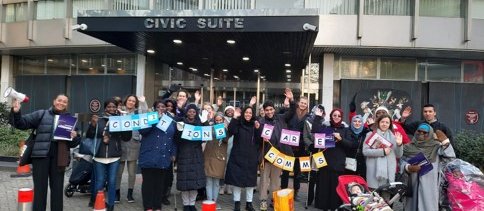Lewisham GPs Declare Housing a Health Emergency
Lewisham GPs Declare Housing a Health Emergency
Following the election of Lewisham's new Mayor, Brenda Dacres, 25 of the Borough's GPs have written to her highlighting the detrimental effects of poor housing on the physical and mental health of our communities.

The letter
Dear Brenda Dacres, Lewisham Mayor,
Congratulations on your election as the new Mayor of Lewisham.
We as GPs in Lewisham are writing this open letter to highlight the current state of poor housing in Lewisham is directly impacting on the health of our residents and to ask for this to be a priority issue of your mayorship.
Our Health Equity Fellows working in each Primary Care Network (PCN) in Lewisham have been working with our local communities to understand their health needs and priorities and what we need to do to reduce health inequality. Time and time again, housing is top of the list.
1. The Urgency of Action Needed
The housing crisis in Lewisham is reaching critical levels, with many families living in substandard conditions that pose serious health and safety risks. Many patients tell us they are at risk of becoming homeless, in debt, or in food poverty due to unaffordable housing. We have patients suffering due to the uncertainty and disruption to their health due to being moved around in temporary accommodation. They miss hospital appointments, do not attend for screening opportunities and face long commutes to see their registered GPs along with the psychological burden of being placed in “temporary accommodation”. We have more and more patients with health problems associated with poor quality housing that we are unable to treat without removing the root cause. We cannot afford to delay action any longer. Every day that passes without addressing this issue is another day with poor health outcomes for Lewisham residents.
2. The link between poor quality housing and ill health
The evidence linking poor quality housing and ill health is well established. There is clear evidence of negative physical health effects of toxins within the home, damp and mould, cold indoor temperatures, overcrowding and safety factors1–3. We often see asthma cases where we are unable to control their symptoms due to constant environmental exposures in their homes leading to potentially life threatening emergencies and recurrent consultations and A&E attendances. There is also the severe burden of negative mental health effects arising from temperature instability, overcrowding/lack of personal space, and damp and mould. Many homes are not adapted to extreme heat and this will become an increasingly significant determinant of health inequalities as summers become hotter in the coming years. Stress and anxiety significantly impact all chronic health conditions and patients tell us that their housing is a cause of extreme stress and anxiety.
3. How housing is linked to health inequalities
We cannot talk about health inequalities without acknowledging the impact of the social determinants of health. In Lewisham, we have an 11 year gap in life expectancy between the wealthiest and poorest. We see significant disparities in health outcomes between our Black and non-white ethnicity residents, those from lower socioeconomic class and inclusion health patients (such as people experiencing homelessness and vulnerable migrants) compared with their white, wealthier counterparts. Around 20% of the households on the lowest incomes live in non-decent homes in England. People with health problems are more likely to occupy the most unsafe and non-decent homes which exacerbates their health problems4. We see that those who are most vulnerable including the elderly and young children, are those living in the poorest quality housing. They then go on to face the highest exposure to environmental hazards due to the disproportionate time they spend indoors4. They also have the least power or agency to change their housing situation.
4. The Impact on Primary Care Capacity
Treating the health problems linked to poor quality housing is estimated to cost the NHS £1.4 Billion per year5. Our clinic rooms are full of patients experiencing lung problems, mental ill health, skin complaints and safeguarding concerns due to poor housing yet we are powerless to address the root cause. It is estimated around 30% of GP consultations are due to completely social issues and top of patients’ concerns is their housing situation. We refer our patients to our social prescribing teams who aim to provide support with social issues; in one PCN over 40% of referrals are due to housing. We get endless requests from patients for letters to support housing applications or complaints. GPs have no capacity to provide this service. This refusal impacts our patient doctor relationships and makes those who we want to support feel hopeless. Those GPs who do support with housing applications may be inadvertently deprioritising another resident in even more need but due to inequities in access we can only support those who make it in to see us. Poor quality housing is costing GP appointments, time and resources that could be going to treating and preventing ill health.
5. Standing with our community
We are working closely with our communities in our PCNs through our health equity teams and we have heard loud and clear that in order to address health inequalities in Lewisham we must support and address the social determinants of health. It is important for us as doctors, as advocates for our patients to be explicit to system leaders that housing must be an emergency issue and we have to work towards meaningful change urgently.
We hope to work with you and your councillors to identify how we can collaborate to address housing as an emergency issue.
We encourage others to stand with us in recognising housing as an emergency issue and to take decisive steps to address this crisis. Our patients deserve safe, stable, and healthy homes where they can thrive and live long healthy lives.
Thank you for your attention to this important matter.re for our community.
Thank you for your attention to this important matter.
Sincerely,
Dr Aaminah Verity – Community of Practice Lead for Health Equity Fellows, GP, Lewisham
Dr Camille Hirons – Health Equity Fellow, GP, North Lewisham PCN
Dr Ama Sogbodjor – Health Equity Fellow, GP, Modality PCN
Dr Ngozi Uduku – Health Equity Fellow, GP, Lewisham Alliance PCN
Dr Michelle Williams – Health Equity Fellow, GP, The Lewisham Care Partnership
Dr Diane Biondini – Health Equity Fellow, GP, Sevenfield PCN
Dr Tanushree Nair – Health Equity Fellow, GP, Aplos PCN
Dr Grace Bottoni – GP, South Lewisham Group Practice
Dr Louise Irvine – GP, Amersham Vale Practice
Dr Lucy Baxter – GP, Amersham Vale Practice
Dr Sharavanan Jeyanathan – GP, Clifton Rise Practice
Dr Jay Bowden – GP, Deptford Surgery
Dr Sam Wessely – GP, Amersham Vale Practice
Dr Jaspreet Bains – GP, Amersham Vale Practice
Dr Sonya Ghatahora – GP, Deptford Surgery
Dr Lola Fakoya-Sales – GP, Locum GP
Dr Sarah Van Cooten – GP, Jenner Practice
Dr Christopher Schoeb – GP, Deptford Surgery
Dr Charlotte Juman – GP Registrar, Bellingham Green Surgery
Dr Alexie Zimmermann – GP, Woolstone Medical Centre
Dr Mary-Louise Smith – GP, Woolstone Medical Centre
Dr David Zhu – GP, Woolstone Medical Centre
Dr Rachel Hadden – GP, Deptford Surgery
Dr Surinder Singh – GP, Amersham Vale Practice
Dr Jamie Bomford – GP, Oakview Family Practice
References
- Marmot M. Social determinants of health inequalities. Lancet. Published online 2005. doi:10.1016/S0140-6736(05)71146-6
- Marmot M. Health equity in England: The Marmot review 10 years on. BMJ. Published online 2020. doi:10.1136/bmj.m693
- Marmot M, Allen J, Goldblatt P, et al. Fair Society, Healthy Lives (The Marmot Review): Strategic Review of Health Inequalities in English Post-2010.; 2010. doi:10.1016/j.puhe.2012.05.014
- British Medical Association. Housing and health : building for the future. London Br Med Assoc. 2003;(May).
- Nicol S, Roys M, Garrett H. The Cost of Poor Housing to the NHS.; 2015.
More signatures to follow.





